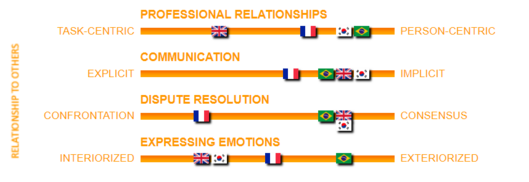The implicit across cultures
Knowing the cultural codes of your interlocutors allows you to avoid many of the pitfalls of implicit communication and to avoid blunders and even conflicts.

The mysterious implicit communication!
Implicit communication can be the source of many misunderstandings and even conflicts. So why do we communicate implicitly? ... For cultural reasons, to keep up appearances, out of fear of saying things face to face, out of humor, out of habit, out of exaggeration, out of inattention, out of casualness, out of courtesy, to avoid conflicts, ... and yet this risks generating conflicts! So how can we understand each other?
Implicit and Explicit
Implicit communication is enigmatic to an "Explicit". Thus the British mode of communication intrigues Americans who generally say what they mean and do what they say. For George Bernard Shaw, "England and America are two countries separated by the same language."
If the Explicit takes every word at face value, the Implicit is more allusive. The former may not understand the latter, who may find the Explicit abrupt, or may misunderstand its intentions by seeking to interpret its words.
Implicit and implicit
Do two implicit people understand each other better? It is not because a British, a Chinese, a French and a Japanese have an implicit communication that they communicate better; indeed their codes are different and misinterpretations are frequent.
When you find yourself in this situation, it is important to know the cultural background of your interlocutor, to try to understand him or her, to rephrase and have someone else rephrase in order to be sure of the meaning of the words and to avoid making mistakes.
Stories of the implicit
To better understand this mode of communication and the different forms it can take, we offer you some examples.
Decoding the British implicit?
Different forms of implicit communication can be identified among the British.
1. Saying the opposite of what you mean
- If a British person says to you "I'm sure it's my fault", you might ask "Why does he think it's his fault?", but he might be telling you that "it's your fault"!
- "That is a brave proposal" does not mean "I think you are brave" but rather "You are insane".
- "Very interesting" does not mean "I am impressed" but rather "That is clearly nonsense".
2. Use the "understatement"
- "Je n'ai que quelques commentaires mineurs" peut signifier "Veuillez tout réécrire".
- "Je ne suis pas totalement à l'aise" peut vouloir dire "Je panique".
To decipher what a Briton is saying, you have to put it in context, look at the non-verbal language and clarify what he is thinking. Some people consider this to be a form of hypocrisy. In reality, this language is meant to be respectful.
In Brazil, implicit or control?
A Brazilian manager comes out of a tense meeting that has irritated him a lot and runs into a colleague; he puts his stress aside to smile and be calm, as if nothing had happened. He wants at all costs to avoid a clash with people who have nothing to do with his annoyance.
In France, it is easier to transmit stress to others without really wanting to or even controlling it. A French person coming out of a difficult meeting may be impatient, not smile much or at all, or even be rude to a person he or she meets in the hallways.
His attitude will then be considered as a real lack of respect, or even a personal attack by a Brazilian.
Resolving this type of situation is then extremely complex.
A Brazilian tends to avoid conflict and remain silent. He will make it clear by other means that the "good" relationship is broken: he will not go for a drink at the end of the day or will be less involved in work, ... A Frenchman who sees the Brazilian's attitude change may reframe him; this leads to a situation where no one understands each other anymore and a bad work atmosphere prevails.
Is Korean implied?
Martine Prost, director of the Institute of Korean Studies at the Collège de France, talks about the quality of the relationship, the "Jeong". This is an important concept for Koreans who consider that the French do not have a "Jeong".
"When the situation is not predetermined or predictable, the "nunchi" (chi: strike, nun: eye), the ability to read the eyes of others, to feel things intuitively, intervenes. It is through it that the subject perceives and interprets the immediate contextual data... Simple sensor of sensations and pointer, the "nunchi" can give rise to "jeong" but also, according to the cases, to mistrust, resentment or any other reaction.
In his book Doing busines with Koreans, Seoil Chay talks about this topic. Koreans don't say everything and often speak indirectly, without explicitly saying what they like or dislike, to keep up appearances and avoid conflicts; therefore, it takes a "good nunchi" to interpret the situation.
Obviously they don't expect foreigners to have "nunchi". Therefore, they will try to be direct and explicit when communicating with them. Since they are uncomfortable with this style of communication, coupled with the language barrier, they may come across as abrupt and rude. This is not because of a lack of education but because they want to be clear in their communication.
Koreans are complex and paradoxical. Shaped by Confucian thought, raised in a language and with implicit customs, they live in a country that has evolved extraordinarily rapidly and in a demanding business world where it is necessary to save time and money and to be understood quickly, even if it means being abrupt.
The French implicit
The French reveal another paradox that is difficult for many outsiders to understand. They can, for example, debate ideas and express their opposition vehemently, but remain allusive when they make remarks about the work of their colleagues, leaving them to guess their intentions.
The Frenchman who attacked a Brazilian in the hallway had no intention of harming him and should not be taken at face value. If the Brazilian had decoded the Frenchman, he would not have held it against him.
As for the British, they don't agree at all when you tell them that the French are implicit. They find them direct and confrontational. At a conference organized by Akteos at the Dutch Embassy, the Dutch explicit was compared to the French implicit. An English participant asked how it was possible to be more explicit than a French person and told this anecdote: every time someone wants to make an appointment with her, she answers "I'll see", and they block her agenda. But for her, her answer is very clear and obviously means that she is not available!
If a French person defends his ideas with vivacity and externalizes his emotions more than a British person, this does not prevent him from being implicit; we are there on different dimensions.
How to decode the implicit?
Everything is relative and you can always find more or less implicit than yourself!
The Nomad Profile' allows us to situate ourselves on axes and to analyze differences and similarities. Here we find the cultural profiles of Brazil, Great Britain, South Korea and France on four dimensions concerning the relationship with others.

To decode an Implicit, it is useful to look at how it is situated on the other dimensions. Is it consensus seeking or not? Is it internalized or externalized? Is it task-oriented or person-oriented?
A good knowledge of cultural codes and a judicious reading of profiles can already provide valuable elements of understanding.
